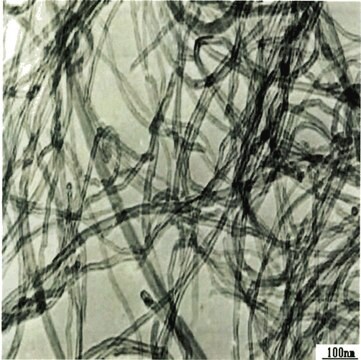637351
Carbon nanotube, double-walled
50-80% carbon basis, O.D. × I.D. × L 5 nm × 1.3-2.0 nm × 50 μm
Synonym(s):
DWNT, Double wall carbon nanotubes
About This Item
Recommended Products
Assay
50-80% carbon basis
form
powder
composition
carbon, >90% (trace metal basis)
O.D. × I.D. × L
5 nm × 1.3-2.0 nm × 50 μm
surface area
>600 m2/g
bulk density
0.12‑0.14 g/mL
Looking for similar products? Visit Product Comparison Guide
General description
Application
Packaging
Preparation Note
Analysis Note
Storage Class Code
11 - Combustible Solids
WGK
WGK 3
Flash Point(F)
Not applicable
Flash Point(C)
Not applicable
Personal Protective Equipment
Choose from one of the most recent versions:
Already Own This Product?
Find documentation for the products that you have recently purchased in the Document Library.
Customers Also Viewed
Articles
Carbon nanotubes are materials that possess remarkable properties and offer extraordinary possibilities.
Carbon nanotubes (CNTs) have received much attention since their discovery in 1991 by Sumio lijima1 due to their excellent mechanical, electrical, and optical properties.
A nanocomposite is typically defined as a mixture between a host material (e.g., polymer matrix) and nanofillers with at least one dimension of less than 100 nm.
Graphene is a one-atomic-layer thick two-dimensional material made of carbon atoms arranged in a honeycomb structure. Its fascinating electrical, optical, and mechanical properties ignited enormous interdisciplinary interest from the physics, chemistry, and materials science fields.
Our team of scientists has experience in all areas of research including Life Science, Material Science, Chemical Synthesis, Chromatography, Analytical and many others.
Contact Technical Service


